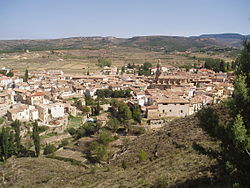This article needs additional citations for verification .(May 2024) |
Rubielos de Mora | |
|---|---|
 | |
| Coordinates: 40°11′N0°39′W / 40.183°N 0.650°W | |
| Country | Spain |
| Autonomous community | Aragon |
| Province | Teruel |
| Comarca | Gúdar-Javalambre |
| Area | |
• Total | 63.72 km2 (24.60 sq mi) |
| Elevation | 929 m (3,048 ft) |
| Population (2025-01-01) [1] | |
• Total | 600 |
| • Density | 9.4/km2 (24/sq mi) |
| Time zone | UTC+1 (CET) |
| • Summer (DST) | UTC+2 (CEST) |
Rubielos de Mora is a municipality located in the province of Teruel, Aragon, Spain. According to the 2004 census (INE), the municipality had a population of 652 inhabitants.

Wikimedia Commons has media related to Rubielos de Mora .


